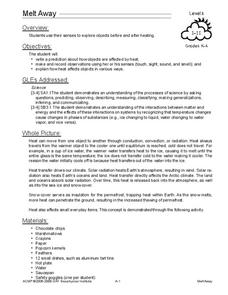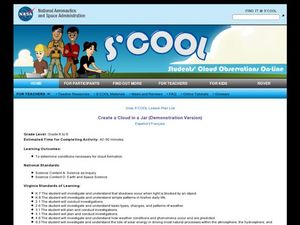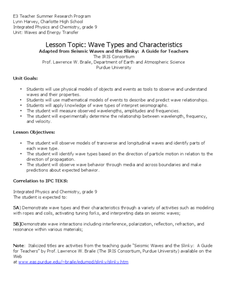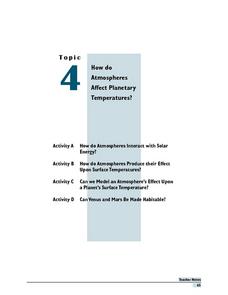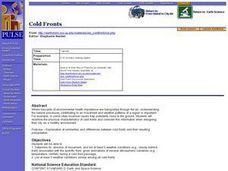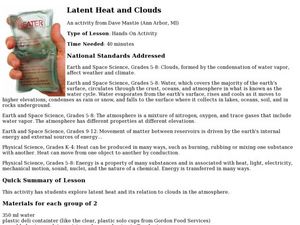Curated OER
Melt Away
Students explore objects before and after heating using their senses. In this matter and energy instructional activity, students experiment with a variety of objects and use their senses (except taste) to make predictions and...
Curated OER
Create a Cloud In a Jar
Students investigate cloud formation. In this weather lesson, students examine how clouds are formed. Students participate in experiments that model how water vapor in the air works.
Curated OER
Clouds
Test your students' science and/or reading comprehension skills with this activity, which provides a page of information about clouds and cloud classification. Both an earth science teacher and a language arts teacher could use this...
Curated OER
Scientist Tracking Network
Students correlate surface radiation with mean surface temperature of several geographic regions. They observe how these parameters change with latitude and construct an understanding of the relationship of solar radiation to seasonal...
Curated OER
Ocean Currents and Sea Surface Temperature
Young scholars use satellite data to explore sea surface temperature. They explore the relationship between the rotation of the Earth, the path of ocean current and air pressure centers. After studying maps of sea surface temperature and...
Curated OER
Nitrogen Cycle
Students identify the main concepts and ideas of the nitrogen cycle.
They review key concepts covered up to this point in ecology including food chains, food webs, energy pyramids, and bio-geochemical cycles.
Curated OER
'Round and 'Round it Goes!
Students discuss and interpret background knowledge on poster copy given on the water cycle. Students complete the included activity sheets using the poster as a reference in small groups. Students identify and name where water can be...
Curated OER
Solar Cycle
Students explore the solar cycle through a series of experiments. In this space science activity, students construct and evaluate solar cycle graphs. They explain how this phenomenon affects the Earth.
Curated OER
Local Weather And Location
Students explain how uneven heating of Earth affects wind and water currents. They describe the limits on current technology in predicting weather and how the Water Cycle is related to local weather.
Curated OER
Water Cycle
Ninth graders explore ways water moves through various reservoirs on Earth, examine how human activities change water cycle, investigate substances present in water that indicate human activity, and discuss how understanding water cycle...
Curated OER
Follow the Sun
Students use a simple model of the Earth and Sun as seen from space to explore the sun's apparent movement across the sky over the course of a day and year. They consider the apparent direction of movement and changes in the sun's angle.
Curated OER
Chemistry in Action
In this chemistry in action instructional activity, students read about sulphuric acid, the use of metals, the production of titanium and the detection of chemical elements and compounds. Students are given 8 statements about what...
Curated OER
Seasons and Cloud Cover, Are They Related?
Students use NASA satellite data to see cloud cover over Africa. In this seasons activity students access data and import it into Excel.
Curated OER
Water in the Biosphere
Environmental explorers examine the campus and take note of living organisms. Introduce them to the biosphere and the questions of the day: How much water can be found in the biosphere? A slide show helps you along, and even contains a...
Texas State Energy Conservation Office
Investigation: Automotive Emissions and the Greenhouse Effect
It is recommended that you conduct this fabulous experiment as a whole-class demonstration. Collect air samples from the environment, human exhalation, and car exhaust, then compare them for carbon dioxide content using bromthymol blue...
Curated OER
Studying Exothermic and Endothermic Reactions
Students explore the mesosphere and lower thermosphere globally and achieve a major improvement in our understanding of the fundamental processes governing the energetics, chemistry, dynamics, and transport of the atmospheric region....
Curated OER
Modeling the Greenhouse Effect
Students simulate the greenhouse effect and draw a model of what he/she thinks is happening. They draw inferences from the model and from other resources to determine possible outcomes of increased earth temperatures.
Curated OER
Weather, Sea Level Rise and Climate Change Course
Young scholars explain the impact of glacial melting to global climate change. In this environmental science instructional activity, students design an experiment to investigate the effect of salinity change to melting glaciers. They...
Curated OER
The Chemistry of Coal
Students investigate the chemistry of coal. This lesson serves as a review of conservation of mass, simple reactions and equation balancing. During the lesson, students research chemical components of coal, as well as environmental...
Curated OER
Wave Types and Characteristics
Ninth graders identify the different parts of a wave. In this physics lesson, 9th graders observe wave behavior as it travels through a boundary. They determine the relationship between wavelength, frequency and velocity.
Curated OER
How Do Atmospheres Affet Planetary Temperatures?
Students perform a literature search and use reputable research resources in order to find the surface temperature of different planets in our solar system. They speculate about the observed and unobserved factors. Then brainstorming is...
Curated OER
Earth Processes
Fourth graders explore and discuss the process of evaporation. They discuss how wet things become dry. Students observe the process of evaporation and they make predictions about the observations they make about evaporation. Students...
Curated OER
Cold Fronts
High schoolers determine its' direction of movement, and list at least five weather conditions associated with the specific front, given animations of several atmospheric variables during a cold front passage. They list at least three...
Curated OER
Latent Heat and Clouds
Learners explore latent heat and how it relates to clouds in the atmosphere. In this earth science lesson students investigate how clouds are formed. Learners examine clouds and the water cycle.


